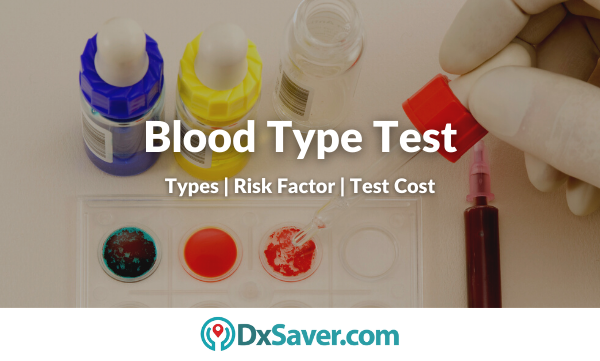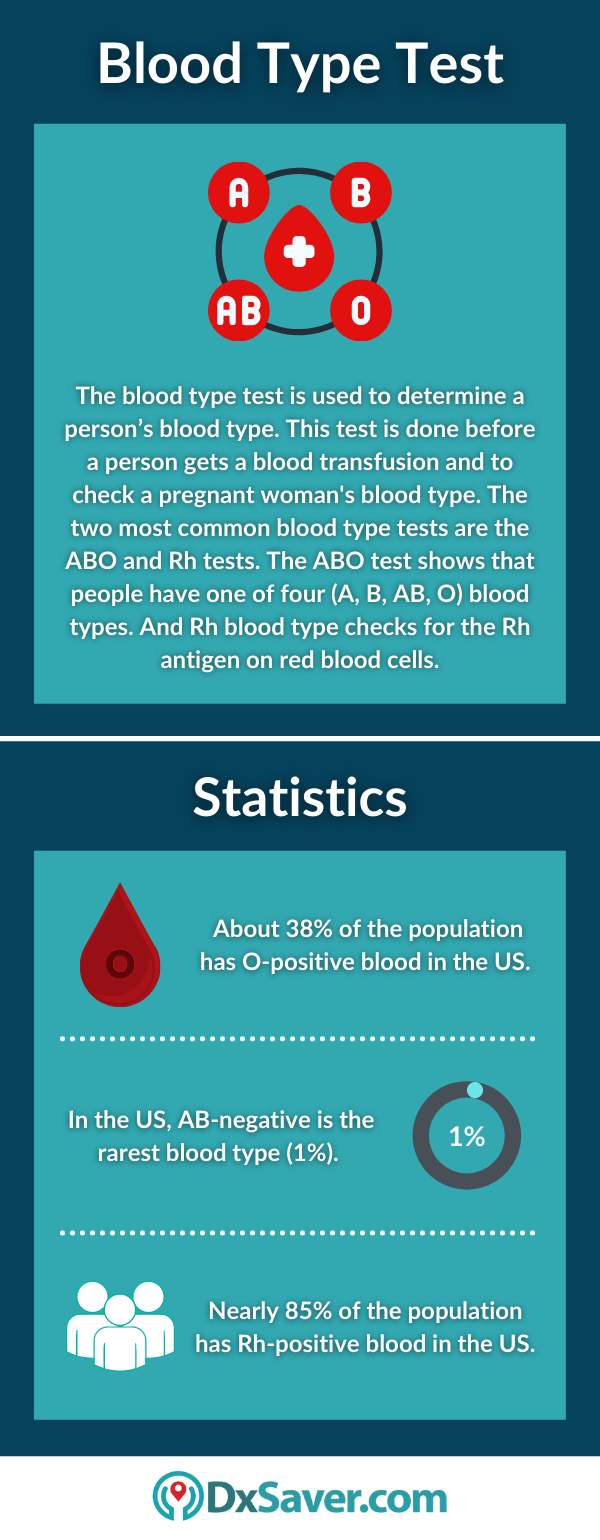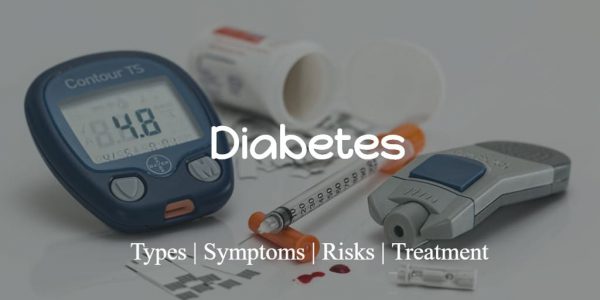
Everyone’s blood is made of the same basic parts. However, there is a lot of variety in the kinds of blood that exist. What makes a person’s blood different from someone else’s is the unique combination of protein molecules, called antigens and antibodies. Antigens live on the surface of the red blood cells and antibodies are in your plasma. A combination of antigens & antibodies in the blood is the basis of the blood type. And the type depends on the genes you inherit from your parents.
This article covers all the significant topics related to the blood type tests such as the test cost, risk factors, and how to get tested for a blood type test.
- Blood type test
- Blood types
- Why a blood type test is done?
- How to prepare for a blood type test?
- How blood type test is performed?
- Risks of this test
- Why blood type is important?
- Which blood types are compatible with a donation?
- Are our blood types inherited?
- Provider locations
For our readers who are interested in knowing the blood type test cost beforehand, we begin with that section.
How much does the blood type test cost?
Blood type test costs range from $49 to $52 in different labs and facilities across the US. Prior appointment isn’t required. You can order tests online by comparing the price or visiting the nearest lab during lab business hours. You will get the results in your email in 2 to 3 business days after completing the procedure. Apart from this, doctor consultation is available for any kind of further treatment or medical advice.
The table below shows the blood type test provider and their prices. You can know more and book the test by clicking on the “Book Now” button. All the labs are certified and offer a network across the US.
Name of our Partner Labs | Book Online at Offer Price |
HealthLabs
| $49 |
Personal Testing Lab
| $52 |
Blood type test cost with insurance
Many insurance companies in the U.S. cover all the vital tests like a blood type test. However, the coverage provided by private health insurance companies and national health insurance programs like Medicare varies widely. Most of the health insurance policies cover blood type test costs only once or twice a year and when your physician orders more than twice in a year, you should pay the test cost out of pocket. So, you are recommended to check if your health insurance policy covers the blood type test cost.
Our blood type testing providers do not accept any kind of health insurance policy. However, they can provide you with an itemized receipt containing all the details viz the name of the test, code of the test, and CPT code which is necessary for insurance reimbursement purposes.
Blood type test
The blood type test is used to determine a person’s blood type. Blood is typed by certain markers on the surface of red blood cells. The test will show if you’re A, B, AB, or O, and whether that blood type is positive or negative. The test is essential when a person needs a blood transfusion or is planning to donate blood. As not all blood types are compatible, it’s essential to know the blood group. When you receive blood that is incompatible with your blood type, it could trigger a dangerous immune response. The two common blood type tests are the ABO and Rh tests.
Blood types
Generally, blood contains red blood cells, which carry oxygen throughout your body, white blood cells, which help fight infection, and platelets, which help your blood clot. But additionally, blood also contains antigens. These are sugars & proteins that sit on red blood cells and give blood its type. There are dozens of blood typing systems but only ABO and the Rh-positive or Rh-negative blood group systems are used widely. These two groups form the 8 basic blood types, it may include:
- A-positive
- A-negative
- B-positive
- B-negative
- AB-positive
- AB-negative
- O-positive
- O-negative
The four main blood groups are based on whether or not you have two specific antigens A and B.
- Group A people have the A antigen and B antibody
- Group B people have the B antigen and the A antibody
- Group AB people have A and B antigens but neither A nor B antibodies
- Group O people don’t have A or B antigens but have both A and B antibodies
The third kind of antigen is the Rh factor. You either have this antigen (Rh+ or positive), or you don’t (Rh- or negative).
Why a blood type test is done?
A blood type test can be done:
- Before a blood transfusion
- When a woman is planning to become pregnant
- Before you donate blood
- Prior to surgery
- Before donating an organ for transplantation
- To exhibit whether two people could be blood relatives
Apart from this blood type test is also used to check the identity of a person who is suspected of committing a crime.
How to prepare for a blood type test?
No special preparation is necessary for blood type tests unless your doctor tells you to.
How blood typing is performed?
A health professional or nurse uses a needle to take a blood sample, usually from the arm. To make the vein fill with blood and swell up, they will tie a band around the upper part of the arm. And the health care provider will clean the area with an antiseptic to help prevent infection. Several samples of blood will be collected into a vial or test tube after inserting the needle. It is common to feel a quick sting or pinch when the needle goes in/out. After taking the blood, the healthcare professional will remove the needle and band. And they will put a piece of gauze and a bandage over the spot to stop the bleeding. Usually, this test takes only a few minutes.
To determine the type, the blood sample will be mixed with antibodies that attack types A & B blood to see how it reacts. The sample will be checked to see whether or not the blood cells clump together. If blood cells clump together, it means the blood reacted with one of the antibodies. And the sample will then be mixed with an anti-Rh serum. If the blood cells clump together (in response to the anti-Rh serum), it indicates that you have Rh-positive blood.
Risks of this test
There is little risk in having a blood type test. You may have slight pain or bruising in the area where the needle was inserted. However, these symptoms go away quickly.

Why blood type is important?
Naturally, the immune system contains protective substances called antibodies, which help fight off material. Generally, they attack bacteria and viruses. But these antibodies can also attack antigens that are not in your natural blood type. When you mix blood from two people with different blood types, the blood can clump, which may be fatal. Because the person who is receiving the transfusion has antibodies that will fight the cells of the donor blood and causes a toxic reaction.
It is important to note that the donor doesn’t always need to have the exact same type of blood as the person receiving it. The types have to be compatible.
Which blood types are compatible with a donation?
Typically, a blood transfusion occurs when a person has experienced trauma or surgery that has resulted in extreme blood loss. It is extremely important to match the blood type of the donor to that of the recipient when a person receives a blood transfusion. Because the body develops antibodies against any ABO antigens that are not naturally present in the blood. Determining which type of blood is compatible for a person depends on the ABO and Rh groups and how they match up. The guidelines below refer to blood and not plasma.
- A positive – Can receive donor blood that is A positive, A negative, O positive, or O negative.
- A negative – Can receive donor blood that is A negative or O negative.
- B positive – Can receive donor blood that is B positive, B negative, O positive, or O negative.
- B negative – Can receive donor blood that is B negative or O negative.
- AB positive – Can receive any blood type (universal recipient).
- AB negative – Can receive donor blood that is AB negative, A negative, B negative, or O negative.
- O positive – Can receive donor blood that is O positive or O negative.
- O negative – Can only receive donor blood that is O negative.
Are our blood types inherited?
A person’s blood type is inherited the same way they inherit the eye color from their biological parents. The ABO genes and the Rh factors come from the father and mother. One may not have the exact same blood type as their parents, due to the many possible combinations.
Provider locations
A blood type test can be done in any of the following locations by visiting the lab near you. To know blood type test cost, refer to the first section of the article.
- Alabama
- Alaska
- Arizona
- Arkansas
- California
- Colorado
- Connecticut
- Delaware
- Florida
- Hawaii
- Georgia
- Idaho
- Illinois
- Indiana
- Iowa
- Kansas
- Kentucky
- Louisiana
- Maine
- Michigan
- Minnesota
- Mississippi
- Missouri
- Montana
- Nebraska
- Nevada
- New Hampshire
- New Mexico
- North Carolina
- North Dakota
- Oklahoma
- Oregon
- Pennsylvania
- Puerto Rico
- South Carolina
- South Dakota
- Tennessee
- Texas
- Utah
- Vermont
- Virginia
- Washington
- West Virginia
- Wisconsin
- Wyoming
Frequently Asked Questions
Will insurance cover my testing cost?
No, insurance will not be covered in the billing. However, they will provide you with a receipt for insurance reimbursement purposes.
How should I book my appointment?
You can choose the most suitable provider from above and make an appointment by following the instructions mentioned by them.
Can I cancel my lab test order?
Yes, you can cancel your lab test order any time before your testing. A refund will be initiated after deducting the cancellation fee. However, cancellation is at the discretion of the provider.
Do the providers offer result interpretations?
Yes, a few providers may provide doctor consultation who will take you through the results and provide clarification if needed.
How do I receive my report?
To ensure your privacy, the test report will be mailed to you by the provider.
Other topics you may also be interested in:-
- Complete Blood Count (CBC) Test Cost in the U.S.
- What is BNP Blood Test? – Causes & Symptoms of High & Low BNP Levels
- What is the Occult Blood Test? – Test Cost, and Procedure
- Importance of BNP Levels in Blood
- Importance of HCT Levels in Blood Test
- What is Troponin in Blood Test?
- Normal Levels of ACTH Hormone in Body
- BNP Hormone and Kidney Health
- Causes of Low PTT Levels in Blood
- Symptoms of Oral Herpes
- What is CoQ10?
- Arsenic Blood Test – Causes, Symptoms & Treatment of Arsenic poisoning
- What is the Mineral Deficiency Test?
- What is MMA Fighter Blood Test?
- Oral HPV Symptoms in Men and Women
- Glucose Blood Test: Purpose, Procedure and Test Results
- What is Perimenopause in Women?






